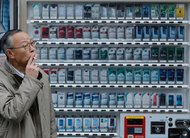The vending machines are also a symbol of the country’s big economic problem: deflation. The price of a soda in a vending machine has stubbornly remained the same for 15 years. Now, as back then, a can of Georgia Coffee, Pocari Sweat sports drink or Kirin Lemon soda typically sells for 120 yen, roughly $1.20. Some discount machines sell cans for as little as 80 yen, less than the price they fetched in the 1980s.
Since taking office in December, Prime Minister Shinzo Abe has made fighting deflation a priority, pumping the Japanese economy with cheap money and bolstering public spending in a bid to kick-start growth.
Such moves have helped stoke the prices of luxury goods like Ferraris, golf club memberships, prime real estate and vintage wines. But so far, the government’s efforts have not had much effect on everyday items, like a can of soda.
Despite the rising cost of raw materials and energy, beverage companies cannot easily raise prices without risking profits. Competition is fierce and consumers remain reluctant to spend.
“If we raised prices first in this cutthroat market, we’d be finished,” said Shigeo Katagiri, who runs the Japan Machine Service, a company that sells canned drinks for 80 yen at about 300 vending machines across Tokyo.
It’s a dynamic that’s playing out in retail, consumer electronics and other industries — and one of Mr. Abe’s biggest obstacles in his efforts to fight deflation.
In theory, Mr. Abe’s economic plan makes sense. More money circulating in the economy should lead to higher prices, and help generate a positive cycle of more investment, profits, wages, spending and growth. It also weakens the yen, which helps exporters sell more goods overseas and raises the price of imports. The prices of Apple iPads, for example, have jumped.
While the early signs are encouraging, it remains to be seen whether such efforts are sustainable and his goals are achievable. Some economists doubt that he can really meet his target of 2 percent inflation in two years. It’s an unspectacular rate for most countries, but a tall order for Japan. So far, the rally in Japan’s stock market has not significantly rubbed off on wages or wealth in a country where just 15 percent of households hold shares, according to a recent Bank of Japan survey. And despite the rising economic sentiment, consumers remain thrifty; the government reported on Friday that consumer spending had cooled.
“Income is still rising only for just a limited number of people,” said Kenichi Hirayama, chief fund manager at Tokio Marine Asset Management.
In many ways, the evolution of vending machines represents the country’s promise and its problems.
In the 1960s, as Japan’s postwar economy boomed and income rose, Coca-Cola brought the first vending machines to the country, selling cans for about 50 yen. In 1973, the Japanese upstart Pokka developed the first vending machine to sell hot drinks.
After that, the price of a can jumped 10 yen each for three consecutive years, as surging oil prices caused inflation. By 1983, cans were selling for 100 yen, and by 1998, they went for 120 yen.
Then Japan’s economy burst, and the country fell into deflation and economic stagnation. Most drink companies did not lower prices, preferring instead to live with lower profits as consumers cut back on spending. But a flurry of third-party vending machine operators, like Mr. Katagiri’s Japan Machine Service, started to source soda on the cheap and sell cans for less than the manufacturer’s suggested price.
By the mid-2000s, even the discount drinks market had become saturated. The beverage market research and consulting company Inryou Souken estimates that about 30 percent of vending machines in Tokyo currently sell cans for less than 120 yen.
Today, some 3.8 million vending machines line Japan’s streets, or about 1 for every 33 people, according to the Japan Vending Machine Manufacturers Association. About two-thirds of the machines sell drinks, and are maintained by the drink makers, or third-party sellers. (The rest sell items as varied as bananas and stationery.)
With more than a dozen national drink makers and countless sellers, crippling rivalries and razor-thin profits have become the norm of doing business.

Article source: http://www.nytimes.com/2013/06/01/business/global/in-japan-a-hard-to-budge-obstacle-looms-over-the-fight-with-deflation.html?partner=rss&emc=rss
